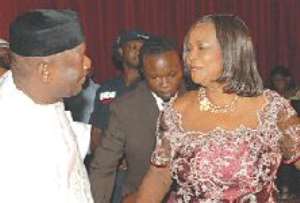
The Chief Justice, Mrs Justice Georgina Theodora Wood, has observed that one of the preconditions for credible elections in December is for journalists in the country to live up to their role as neutral referees.
Describing the media's role in the exercise as awesome, Mrs Justice Wood said theirs was to educate the electorate in a manner that would assist them to make wise political decisions, and not to prejudge the issues.
She made the observation as the Guest Speaker at the 13th annual Ghana Journalists Association (GJA) Awards and Dinner Night held at the Banquet Hall of the State House in Accra.
The Chief Justice noted, however, that effectively discharging that duty might not come easy for the media.
“Given that while in democracies you have a right to freedom of expression, you have a corresponding duty to ensure proper balance in all your undertakings, that is, to be fair and just to all,” she said.
The event was graced by the Vice-President, Alhaji Aliu Mahama, Ministers of State, Members of Parliament and the Diplomatic Corps, among others.
In that atmosphere, and with a heavy media presence, Mrs Justice Wood said, “At all times, and especially in an election year, you should follow the guidelines of the Media Commission and avoid deliberate presentation of scenes, episodes and facts that are meant to excite passion, hatred, contempt and prejudice.”
She said elections served as the cornerstone of any democracy, adding that the deep-seated suspicion and mistrust surrounding the upcoming elections and the potential or real threat of post-election violence in particular placed on every well-meaning Ghanaian a solemn and patriotic duty to proactively work towards free, fair, clean and transparent, credible and peaceful elections.
Mrs Justice Wood noted how journalists were enjoying the present democratic dispensation and cautioned, “Whenever there is an authoritarian system in place, whatever freedom is enjoyed at the beginning yields to a culture of silence or censorship.”
“Plain, good common sense has its rightful place in jurisprudence. Indeed, the philosophical underpinnings of the fairly large number of judicial principles are based on plain common, good sense,” she said.
It was against that background that she noted, “We can, therefore, use the same rationale to persuade you, that it lies in your own interest, if not somebody else's, that all your actions be geared towards that which will promote national peace and stability.”
She said the use of decorous, temperate and refined language and manners was a strict requirement in the judicial setting and the same must apply to journalists.
Mrs Justice Wood said ethnicity was the worst threat to national peace and cohesion, adding, “Consequently, stories involving ethnic or even religious groups must be handled with sensitivity.”
Alhaji Mahama, in his goodwill message, said, “Election years are especially fragile; what the media choose to highlight and hammer is what influences the mood and determines the attitudes of the larger public.”
“Depending on the tone and choice of delivery, insignificant, localised political incidents may be blown up into nation-wrecking events,” he added.
The Vice-President said the people also had a role to play in ensuring that the media kept a good balance in the discharge of their duties and noted that that could be done through support for professionalism through training.
“We need to come to terms with the pervasive nature of knowledge dissemination in the modern age and facilitate access to quality information.
In short, we ought to be proactive with reliable and constructive information, rather than react to rumour and idle mischief,” he said.
The President of the GJA, Mr Ransford Tetteh, reminded journalists of their role in society, which was to promote high journalistic standards, strengthen the contribution of the association and its members to democracy and good governance and promote media accountability and self-regulation.
He said the awards scheme could not have come thus far without the involvement of the public and urged them to contribute to the nomination of the jurists by assigning reasons for their selection.
Mr Tetteh acknowledged the sponsors of the awards, particularly MTN, the BUSAC Fund, Unilever, UNESCO, the French Embassy, the British High Commission, among others.
Story by Charles Benoni Okine.




 Elisu By-election: "If you call yourself a man, boo Chairman Wontumi again" — Bo...
Elisu By-election: "If you call yourself a man, boo Chairman Wontumi again" — Bo...
 Fuel tanker driver escapes with his life after tanker goes up in flames near Suh...
Fuel tanker driver escapes with his life after tanker goes up in flames near Suh...
 Uniform change: ‘Blue and white are brighter colours’ — Kwasi Kwarteng explains ...
Uniform change: ‘Blue and white are brighter colours’ — Kwasi Kwarteng explains ...
 MoE not changing all public basic school uniforms but only newly built ones — Kw...
MoE not changing all public basic school uniforms but only newly built ones — Kw...
 We’re only painting new public basic schools blue and white – Dr. Adutwum clarif...
We’re only painting new public basic schools blue and white – Dr. Adutwum clarif...
 Bawumia has lost confidence in his own govt’s economic credentials – Beatrice An...
Bawumia has lost confidence in his own govt’s economic credentials – Beatrice An...
 I fought WW2 at age 16 – WO1 Hammond shares At Memoir Launch
I fought WW2 at age 16 – WO1 Hammond shares At Memoir Launch
 GRA-SML deal: Regardless of what benefits have been accrued, the contract was aw...
GRA-SML deal: Regardless of what benefits have been accrued, the contract was aw...
 April 26: Cedi sells at GHS13.75 to $1, GHS13.18 on BoG interbank
April 26: Cedi sells at GHS13.75 to $1, GHS13.18 on BoG interbank
 Champion, promote the interest of women if you become Vice President – Prof. Gya...
Champion, promote the interest of women if you become Vice President – Prof. Gya...
